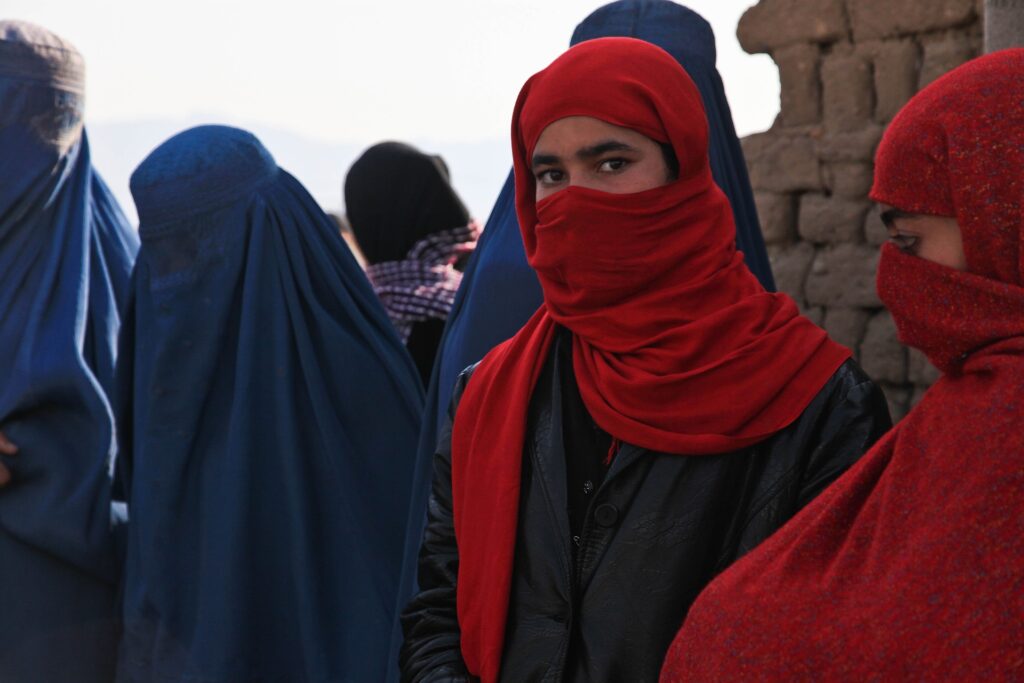Between Promises and Reality
After entering Kabul, the Taliban held a press conference on the 17th of August 2021, to reassure the international community and the country’s residents. The regime promised to respect international human rights standards, including Afghan women’s rights. They said that women could work and even attend university, « in line with Islamic law ».
However, despite these promises, women’s rights have continuously regressed:
- Women were gradually banned from working and attending universities. In March 2022, girls over 12 were prohibited in middle and high schools.
- In May of that year, the wearing of the veil became mandatory through a decree from Haibatullah Akhundzada, the Taliban’s supreme leader, stating that women « should wear a chadri [burqa], as it is traditional and respectful. »
- The following November, women were banned from public places (parks, gyms…). NGOs operating across the country were ordered to stop employing women.
- By July 2023, women were no longer allowed to visit beauty salons.
- Even worse, in March 2024, the Taliban’s supreme leader announced the return of stoning women for adultery, claiming that it was just the strict application of Sharia (Islamic law).
New Tightening of Laws for Women
The latest example of this repression came in August 2024 with the official release of a new 114-page legal document containing 35 articles. This text imposes even more restrictions on women under the pretext of « promoting virtue and preventing vice ». Women must cover their entire bodies and faces, wear clothes that are not « thin, short, or tight », they are forbidden from looking men in the eye unless they are blood relatives, they can no longer sing or recite poetry, must always be accompanied by a male family member in public, etc.
This text raised the concerns of Western countries and international organizations such as the United Nations. What is more, NGOs like Amnesty International denounced the continuous deterioration of human rights and freedoms in Afghanistan. In response, the Taliban considered these criticisms as « arrogant. »
« Decades of progress on gender equality and women’s rights have been undone in a matter of months. We must continue to act together, united in our insistence on guarantees for respecting all women’s rights. »
(Sima Bahous, Executive Director of UN Women)
– Read the entire speech –
Asylum Rights Granted to All Afghan Women
At the beginning of the year, the National Court of Asylum (CNDA) issued a ruling recognizing that all Afghan women constitute a vulnerable social group, making them eligible for refugee status. This decision followed the worsening of women’s situation under the Taliban regime and the persecution they face in the country. Thanks to this ruling, Afghan women can now ask for international protection and seek asylum in Europe.
(Learn more here about this ruling of the CNDA)
However, even though this measure is highly positive, it is important to highlight a reality: most of the women in Afghanistan cannot travel alone or even leave their homes. Then, the efficiency of this ruling is questionable: how can they seek asylum elsewhere if these women are unable to leave the country?
The Evolution of Afghan Women’s Rights Through History
Historically, Afghan women’s rights have not always been so repressive. They have evolved positively under various leaders and have declined especially under the Taliban regime.
King Amanullah Khan (1919–1929)
In 1919, Afghan women obtained the right to vote, long before some Western countries. For example, the U.S. granted women the right to vote in 1920, and France in 1944. However, even though this right was granted, it was not widely implemented due to strong resistance from conservatives. These reforms were quickly revoked at the end of that king’s reign.
During his reign, the king wanted to modernize Afghanistan. Women enjoyed more freedoms, had access to education and employment, particularly in major cities, and forced marriage was banned. In 1921, the first girls’ school opened.

King Mohammad Zaher Shah (1960–1970)
For 10 years, new reforms allowed women to attend university, work, and dress as they wished (no longer mandatory veil).
The 1964 Constitution reaffirmed the women’s right to vote by truly implementing it. The following year, 4 women became members of parliament, 2 became senators, and the country saw its first female minister, Kubra Noorzai. However, women in rural areas remained excluded from education and were expected to marry and obey their husbands.
Soviet Influence (1979–1989)
In 1979, the Soviet Union invaded Afghanistan to support the communist Afghan regime. Social reforms were implemented to instill communist ideology, including gender equality, mandatory schooling for girls, and the abolition of dowries (money paid to the bride’s family by the groom). The veil was also banned to remove religion from daily life.
However, these reforms faced strong resistance in conservative rural areas, which continued to strictly apply Sharia.
First Taliban Regime (1996–2001)
In 1996, the Taliban came to power, marking the first major regression of women’s rights because of the « strict application of Sharia. » Women were banned from working, attending school, or leaving their homes without a male chaperone.
They were gradually erased from public life, and those who did not comply with the regime’s rules faced physical punishments.
U.S. Influence (2001–2021)
Following the U.S. intervention in Afghanistan in 2001, part of its « war on terror » (against terrorism) after the 9/11 attacks, the Taliban regime fell. A new government was established, and the aim of the 2004 constitution was to restore women’s political and social rights.
In 2016, women held 27% of parliamentary seats, and many held high-responsibility positions in the government. That same year, 2.5 million girls were enrolled in school.
Second Taliban Regime (since 2021)
After the withdrawal of US forces in 2021 and the Taliban’s return to power, women’s rights diminished again. Once more, women have been progressively excluded from public life, and a newly adopted legal text has further restricted their rights.
(Afghan women’s rights)











3 comments
Insanont This is my first time pay a quick visit at here and i am really happy to read everthing at one place
Thinker Pedia I am truly thankful to the owner of this web site who has shared this fantastic piece of writing at at this place.
I haven’t checked in here for some time since I thought it was getting boring, but the last several posts are good quality so I guess I will add you back to my daily bloglist. You deserve it my friend 🙂